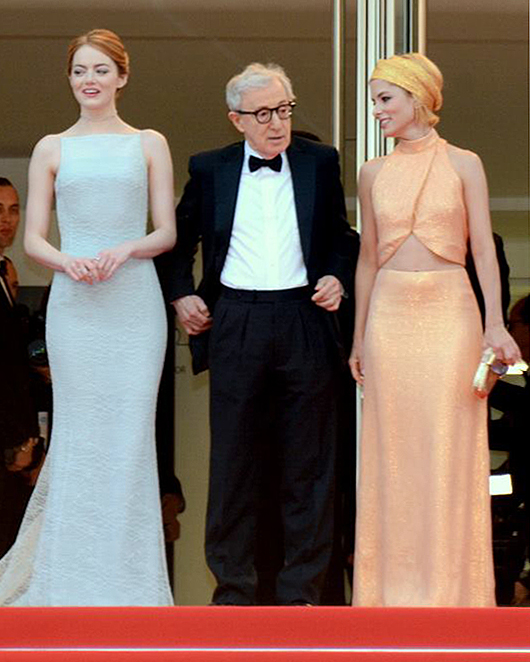Woody Allen
Woody Allen

Heywood Allen, born Allan Stewart Konigsberg on November 30, 1935, is a prominent American filmmaker, actor, and comedian with a career spanning over six decades. He is highly acclaimed, having received numerous awards and nominations, including multiple Academy Awards, BAFTA Awards, Golden Globe Awards, and a Grammy Award. Additionally, two of his films have been included in the National Film Registry by the Library of Congress.
Allen's career began in the 1950s, where he wrote material for television alongside comedy luminaries such as Mel Brooks, Carl Reiner, Larry Gelbart, and Neil Simon. He also gained recognition for his short stories published in books and his humor pieces for The New Yorker. Transitioning to stand-up comedy in the early 1960s, Allen developed a unique monologue style and persona characterized by insecurity, intellectuality, and neuroticism.
Throughout the 1970s and beyond, Allen achieved success as a filmmaker, directing, writing, and often starring in a series of acclaimed comedies. Some of his notable works during this period include "Take the Money and Run" (1969), "Bananas" (1971), "Sleeper" (1973), and "Love and Death" (1975). However, his breakthrough came with "Annie Hall" (1977), a romantic comedy that earned multiple Academy Awards, including Best Picture and Best Director for Allen.
Renowned for his portrayal of New York City in his films, Allen continued to produce a prolific body of work, including "Manhattan" (1979), "Hannah and Her Sisters" (1986), and "Crimes and Misdemeanors" (1989). His films often reflect influences from European art cinema, solidifying his reputation as an auteur filmmaker.
Despite his professional success, Allen's personal life has been marked by controversy. His relationship with actress Mia Farrow, which began in 1979 and led to the collaboration on numerous films, ended amidst allegations of sexual abuse involving their adopted daughter, Dylan Farrow. Though Allen was never charged or prosecuted, the accusation garnered significant media attention and remains a controversial aspect of his legacy. Allen married Soon-Yi Previn, Mia Farrow's adopted daughter, in 1997.
Despite the controversies, Allen's contributions to cinema continue to be celebrated, with his films admired for their wit, intellect, and exploration of human relationships and neuroses.
Woody Allen, originally Allan Stewart Konigsberg, was born in New York City on November 30, 1935. Although his family resided in Brooklyn, his birth occurred at Mount Eden Hospital in the Bronx. Coming from a Jewish background, Allen's parents, Nettie and Martin Konigsberg, worked in different professions—Nettie as a bookkeeper at her family's delicatessen, and Martin as a jewelry engraver and waiter. Allen's grandparents immigrated to the United States from Austria and the Lithuanian city of Panevėžys, and they were fluent in German, Hebrew, and Yiddish. He grew up alongside his younger sister Letty in Brooklyn's Midwood neighborhood, where both his parents were born and raised on the Lower East Side of Manhattan.
Allen's upbringing was marked by discord between his parents, particularly his strained relationship with his mother, who was described as authoritarian and ill-tempered. Despite his Jewish heritage, Allen attended interfaith summer camps during his youth. He received education at Hebrew school for eight years while also attending Public School 99 and Midwood High School, from which he graduated in 1953. Despite his later comedic persona, Allen was more interested in baseball than academics, and his talent for the sport ensured he was often picked first for teams. Additionally, he impressed his peers with his skills in cards and magic tricks.
During his teenage years, Allen began writing jokes, or "gags," which he sold to agent David O. Alber. His early success in the world of comedy led him to legally change his name to Heywood Allen at the age of 17, later adopting the nickname "Woody." Allen quickly found financial success with his jokes, often earning more than both of his parents combined. After completing high school, he enrolled at New York University to study communication and film in 1953 but dropped out after failing the course "Motion Picture Production." He then briefly attended the City College of New York in 1954 but left during the first semester, opting to teach himself rather than pursue formal education. Allen later taught at The New School and studied with renowned writing teacher Lajos Egri as he honed his craft as a filmmaker and comedian.
Woody Allen's journey as a writer began at the age of 15 when he started crafting short jokes. The following year, he began sending these jokes to various Broadway writers, hoping to sell them. One of the writers who received Allen's jokes was Abe Burrows, coauthor of "Guys and Dolls," who was highly impressed by Allen's work. Burrows wrote glowing letters of introduction for Allen to Sid Caesar, Phil Silvers, and Peter Lind Hayes, leading to immediate payment for Allen's jokes.
At just 19 years old, Allen was invited to join the NBC Writer's Development Program in 1955, which eventually led to a position on "The NBC Comedy Hour" in Los Angeles. He began his full-time writing career by working for humorist Herb Shriner, initially earning $25 a week. Allen quickly made a name for himself in the industry, writing scripts for various television shows, including "The Ed Sullivan Show," "The Tonight Show," and specials for Sid Caesar. He collaborated with comedy legends like Mel Brooks, Carl Reiner, Larry Gelbart, and Neil Simon, further honing his craft.
Throughout the 1950s and early 1960s, Allen's prolific output and sharp wit earned him a reputation as a comedic genius. He wrote jokes for numerous comedians and television shows, including the "Candid Camera" series. His daily writing routine was intense, sometimes lasting up to 15 hours, and he was known for his ability to churn out joke after joke. Even after transitioning to stand-up comedy, Allen maintained a high standard, using only the best jokes out of the many he wrote.
In addition to his work in television, Allen ventured into writing short stories and cartoon captions for publications like The New Yorker. He drew inspiration from humorists such as S.J. Perelman, George S. Kaufman, and Robert Benchley, modernizing their style with his own unique voice. Allen's collections of short pieces, including "Getting Even," "Without Feathers," and "Side Effects," showcase his talent for blending humor with wit and satire.
In 2010, Allen released audio versions of his books, titled "The Woody Allen Collection," where he personally read 73 selections. This earned him a nomination for a Grammy Award for Best Spoken Word Album, further solidifying his status as a master of comedic storytelling.
References
- Allen 2020, p. 11.
- ^ Evanier 2015, p. 66.
- ^ Horgan, Richard (December 14, 2015). "Woody Allen's Bronx Bump". Adweek. "Woody's birthday is not really December 1; it is November 30."
- ^ "Revisiting Woody Allen’s Highs, Lows On His 80th Birthday". MetroFocus. December 1, 2015. "Today on Dec. 1, film legend Woody Allen celebrates his 80th birthday. However, it's not his real birthday. He was born on Nov. 30 but chose the first of December as his birthday so he could be no. 1."
- ^ Evanier, David (November 9, 2015). "How Woody Allen Got His Nickname". Time.
- ^ "Woody Allen | Biography, Movies, & Facts". Encyclopædia Britannica. Retrieved January 11, 2024.
- ^ Leonte, Tudor (November 28, 2022). "Celebrity Actor & Director Birthdays This Week: Woody Allen Turns 87". Y! Entertainment.







































